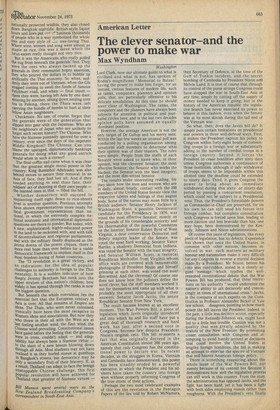The clever senator and the power to make war
Max Wyndham
Washington
Lord Clark, now our ultimate guide to what is civilised and what is not, has spoken of Rodin's magnificent 'Memorial to Balzac ' having the power to make him forget, for an instant, certain features of modern life, such as tanks, computers, planners and opinion polls, that are particularly offensive to his delicate sensibilities. At this time he should steer clear of Washington. The tanks, the computers and the planners have always been subjects for attention in political and journalist circles here; and in the last two decades opinion polls have assumed an equally dominant position.
However, the average American is not the only target of Dr Gallup and his merry men. Within the last few weeks an unusual poll was conducted by a polling organisation among senatorial staff members to determine what their opinion was of their masters. The rules were simple. People from the staffs of each Senator were asked to name who, in their opinion, was the cleverest Senator; the most effective Senator; the Senator who works the hardest; the Senator with the least integrity; and the most dim-witted Senator.
The results make interesting reating, for they show how the men and women who are in daily, almost hourly, contact with the 100 'members of the United States Senate view the respective talents and failings of that august body. Some of the names may mean little to a British audience. Senator Henry Jackson of Washington State, a possible Democratic candidate for the Presidency in 1976, was voted the most effective Senator, mostly on the grounds of his considerable seniority and his chairmanship of the powerful Committee on the Interior; Senator Robert Byrd of West Virginia, a dour conservative Democrat and deputy majority leader of the Senate, was voted the most hard working; Senator Vance Hartke, a shadowy Democrat from Indiana, was voted the Senator with the least integrity; and Senator William Scott, a teetotal Republican Methodist from Virginia whose, office walls are covered with innumerable photographs of President Nixon and himself grinning at each other, was voted the most dim-witted. And the cleverest? Of course one does not know how the pollsters define the word clever, but the staff members worked it out for themselves and came up with what is probably the most appropriate of all their answers: Senator Jacob Javits, the senior Republican Senator from New York. The result became known at an excellent moment. The War Powers Bill, a piece of legislation which Javits originally introduced and into which he and his staff have put a great deal of thorough research and hard work, has just, after a second vote in Congress, become law despite President Nixon's original veto. This bill re-asserts a fact that was originally decreed in the American Constitution almost 200 years ago, namely that only Congress has the constitutional power to declare war. In recent decades, as the struggles in Korea, Vietnam and Cambodia have demonstrated, this power has been steadily eroded by a powerful executive, in which the President and his advisers have taken the country into foreign wars without properly informing Congress of the true intent of their actions. Perhaps the two most celebrated examples of this are the revelation in the Pentagon Papers of the lies told by Robert McNamara, then Secretary of Defence, at the time of the Gulf of Tonkin incident, and the secret bombing of Cambodia by President Nixon anti Melvin Laird. It is true of course that through its control of the purse strings Congress could have stopped the war in South-East Asia at any time, simply by cutting off the supply of money needed to keep it going; but in the history of the American republic the legislative branch has never exercised its power to behave in this fashion, even when the Senate was at its most dovish during the tail end of the Vietnam war.
So what, then, does the Javits bill do? It simply puts certain limitations on presidential war powers in three well-defined ways. First. it makes the President explain his policy to Congress within forty-eight hours of committing troops to a foreign war or substantially adding to the number of combat troops in a foreign country. Second, it forces the President to cease hostilities after sixty days unless Congress authorises a continuance of those hostilities, although if' safe withdrawal of troops seems to be impossible within this allotted time the deadline could be extended to ninety days. Third, it gives Congress the power to bring about an immediate withdrawal during this sixtyor ninety-day period by passing a concurrent resolution, which could not be subject to a Presidential veto. Thus, the President's formidable Powers as Commander-in-Chief are preserved, for on his own he can still send his forces into foreign combat, but complete consultation with Congress is forced upon him, leading to more caution and less bravado than has, one may hope, been demonstrated by the Kennedy, Johnson and Nixon administrations.
Of course this piece of legislation, like every piece of legislation, has its defects. Experience has shown that once the United States, in common with other nations, becomes involved in war, such matters as military honour and nationalism make it very difficult for any Congress to reverse a martial decision made by a President. Mr Nixon, before his veto was over-ridden, stated in a closely argued message, which typifies the well-. reasoned constitutional debate that the War Powers Bill has produced, that these restrictions on his authority "would undermine the nation's ability to act decisively and convincingly in times of international crisis." Javits, in the company of such experts on the Constitution as Professor Alexander Bickel of Yale law school, disagrees, pointing to how much power the bill leaves the President. Indeed, in the past, a little less decisive action, especially during the Kennedy-Johnson era, might have led to a little less trouble. Caution was not a quality that was greatly admired by the zealots of the New Frontier. By promoting closer consultation with Congress and attempting to avoid hastily arrived at decisions that could involve the United States in lengthy foreign hostilities, the bill is making an attempt to exorcise the spectre of Vietnam that still haunts American foreign policy.
There is something reassuring about the whole issue of the War Powers Bill, not merely because of its content but because it demonstrates how well the legislative process can still work in this country. From the start, the administration has opposed Javits. and the fight has been hard; yet it has been a fight with both sides employing reason rather than roughness. With the President's veto finally over-ridden, the Senator can congratulate himself. There can be few more suitable sponsors for this bill than this New Yorker, with his record of humane legislation (earlier this year he introduced a major pension reform bill), the respect with which he is regarded in Congress, and his formidable expertise as a parliamentarian. The Senate staff have made a just decision. In this time of tapped telephones, dirty tricks and liberal sanctimony it is useful to think of Rodin's 'Memorial to Balzac ' and of Senator Jacob Javits, and, for an instant, to rejoice.
Max Wyndham (Lord Egremont) is at present on the staff of a US Senator and is to contribute regularly to The Spectator.



































 Previous page
Previous page